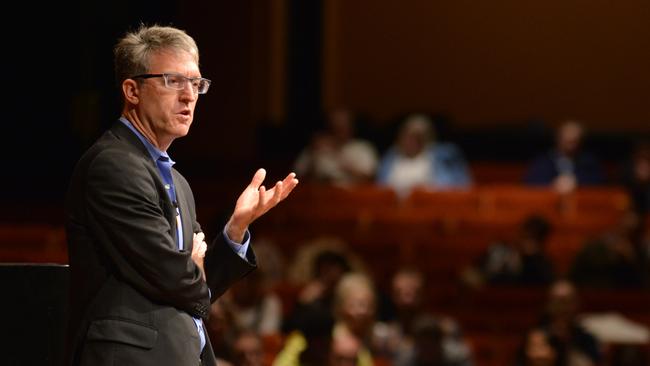Drunk walking is more dangerous than drunk driving, according to Freakonomics author Steven Levitt
THOUSANDS of people are killed drink-driving every year, but this economist has crunched the numbers and discovered a bigger danger.

STEVEN Levitt has spent “more time than any reasonable person would” proving the Japanese sport of sumo wrestling was rife with cheating.
The University of Chicago economist and best-selling author of Freakonomics, whose research has spanned topics from the impact of abortion on crime to wage distribution among drug gangs, has also spent “a lot of time thinking about prostitution”.
“Maybe the craziest thing I’ve been thinking about lately is the danger of drunk walking,” said Levitt, who is currently in Australia to speak alongside renowned author Malcolm Gladwell at a series of seminars in Sydney and Melbourne.
“Drunk walking turns out to be far more dangerous than drunk driving,” he said. “If you’ve got to go three miles, I would definitely recommend getting into a car rather than walking.”
Levitt is quick to point out he’s being facetious and he is in no way advocating for drink-driving. Although “it sounds amusing”, he said, drunk walking is a serious public safety issue which deserves attention from authorities.
“Somewhat amazingly, over 1000 people a year are killed [in the US] from being hit by a car while walking drunk. [It’s a] simple calculation about the number of miles people walk drunk compared to the number people drive, which is not that many.
“What’s interesting to me is I really think I’m right, the data [is] obvious, but every time I talk about drunk walking people just laugh. They can’t find a way to take the issue seriously. I know in Australia people take the issue of drunk driving very seriously.”
So how do you change people’s behaviour?
“It’s tricky,” Levitt said. “The only person hurt by walking drunk is yourself. Usually as an economist, if someone wants to risk their own life we usually let them. I’m not sure there is an obvious policy response that we should ban it or anything.”
But he argues it “wouldn’t be crazy” to extend anti-drink-driving campaigns to the pavement. “A lot of time and resources [have been spent] spreading the word about the risks of drunk driving to change social norms,” he said.
“I think it would be sensible to extend their messaging to drunk walking, but they just don’t seem interested in that at all.”
Levitt, whose presentation at The Growth Faculty event highlights “new ways to create behaviour change” and the “incentives that work and don’t work”, said he had “almost given up” on the concept.
“If there’s one thing I think is almost impossible, it’s behaviour change,” he said. “Whenever I look at a problem, I usually don’t start with behaviour change, I start with technology. When you look at the historical record, if you want to fix a problem, technological shortcuts have been the secret to overcoming things.”
In the absence of a technological fix, Levitt is a fan of the behavioural science idea of “nudge theory” which has recently gained popularity among governments — in 2015, Malcolm Turnbull announced the formation of a “nudge unit” inside the Department of Prime Minister and Cabinet.
“It’s a spin on the usual economics approach,” Levitt said.
“So typically, economists will say, ‘If I give people the right incentives I can get them to act in the way I want.’ Nudge is different. ‘I know nobody’s paying attention, the world’s too complex and they’re too busy, so I’m just going to set things up to essentially manipulate their behaviour.’”
He cites a recent change in the United States which made employer retirement savings accounts opt-out rather than opt-in. “They can’t force you, so if you want to go through the trouble of opting out [you can], but very few people do it — just in the way that very few people took the time to set up retirement accounts,” Levitt said.
Whether or not nudge theory is ethical is a “tricky premise”, he said. “If you want someone to give you a smart answer about the line between ethical and unethical, I don’t think you would ask me or any economist. What economists are good at giving is efficiency, not necessarily what’s right.”
Overall, Levitt classes himself more as a “pragmatist” than a Keynesian or any other school of economics. “Honestly I know so little about macro-economics,” he said.
“I can’t tell you anything about what the economy is going to do or should do or how you should organise the money in the banking system. I class myself in a different dimension. “What I’m interested in doing is looking for simple answers to simple, good questions.
“Not super important, not world-changing, questions that matter to somebody that potentially can make the world a better place.”




